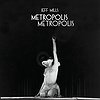Name: Jeff Mills
Nationality: American
Occupation: Producer, composer, improviser
Current release: Jeff Mills's Metropolis Metropolis is out via Axis. Order directly from the label or here if you're buying from Europe.
Metropolis Metropolis marks the third time Jeff Mills has scored music for Fritz Lang's iconic movie Metropolis. Each of these interpretations saw Mills taking an intriguingly different approach to a film whose dramatic theme, as he puts it, “is as relevant now as it was when the filmed debuted in 1927.”
Whereas the first Metropolis score, released in 2000 via Tresor, still worked within the more familiar tropes of techno, ambient, and experimental soundscapes, this new take is closer to the hallucinatory qualities of Gottfried Huppertz's original 1927 vision. Interestingly, Mills confesses to not having heard Huppertz's score, but he rightly points out: “Although I’m not familiar with Mr. Huppertz’s score, the film does leave open many possibilities for interpretation.”
Indeed it does. Fusing elements from classical and electronic traditions, Metropolis Metropolis places the listener in an aural scenery “based on the environment of the scenes, rather than pure transcription.” The result, presented on CD and a 3LP set in an edited form from the full soundtrack, is intense, disorienting and of an otherworldly sensuality. Mills has not just written a sonic accompaniment to a classic here. Effectively, as we'll touch upon in this interview, he has created a new experience of the movie itself. Which fits his description of Metropolis as “a film to be enjoyed, but also noted and examined.”
Metropolis Metropolis has turned into a statement that is distinctly Mills's and retains its creative power even outside the movie's striking images. Which is not to say that he did not take the director's intentions into consideration. When I ask him, at the end of the interview, whether he ever thought of Lang's feedback about his contributions, he answers with a clear and resounding “yes”.
Jeff Mills will perform Metropolis Metropolis live at a screening of the movie at Berlin's Babylon cinema on April 5th 2023. Go here for tickets.
If you enjoyed this interview with Jeff Mills, find out more about him and his work on Facebook, Twitter, Instagram or Spotify. To keep reading visit our earlier Jeff Mills interview.
In his excellent liner notes to Metropolis Metropolis, Terry Mathews writes about some of the reasons why Metropolis has remained an inspiration to many for such a long time. What still inspires you about the movie today, after watching it for many times?
What inspires me the most is that, in some ways, the facts are that our society has not yet fully understood the overall message of the film which was made about 100 years ago in 1927: That, we either keep forgetting or ignoring the reality that the differences between us are so minute that we’re all basically one big organism. Where functionality greatly depends on one another. Healthy in mind, body and spirit.
In our evolution, 100 years isn’t a long time when we think about how far we’ve come. But, as we look forward to next 100, one of the most important subjects I can think of is the welfare and conditions of the average person. Where will this part of society be in Century from now?
2001 is another movie you appreciate and just like Metropolis, it offers an intriguing look at the future. Which of these two visions of the future is closer to your own, would you say?
In the not-so-distant future, I’d have to choose Blade Runner. But, I actually think that we might closer to a George Lucas’s THX 1138 (1971). Where humans will have to live underground due the intense heat and radiation conditions on the surface of the planet.
And, I also envision a time when each human will be born into a society where everyone will have a role to play for maintaining our civilisation. That, it will be essential to work together.
So, the individual freedom to choose what you do for a career might not be possible.
You've scored several movies now and to me, this part of your oeuvre has by now yielded some of your strongest material. How do you see your soundtrack contributions work in relation to your overall body of work – and do you feel any kinship to specific traditions and lineages?
In the body of creations that I’ve produced over the many years, each production, release or album is connected to one another. It’s like a gigantic Jigsaw puzzle, where one “piece” is part of a larger composite. Without that piece, the image could never be complete.
So for example, the musical work I’ve created for contemporary dance is very much connected to what I produce for the dancefloor, the music I produce for orchestras is connected to film soundtracks. The free jazz productions are connected to Techno.
All in the way of an internal perspective of what Music is all about and how it can affect people.
Fritz Lang is quoted as saying, “I was primarily a visual artist. I never had an ear, and I regret it.” And yet, Metropolis features many scenes which are, it would seem to me, clearly rhythmically choreographed. Since you're extremely close to his work through your scores, what do you make of that statement? Do you think Lang was maybe unconsciously compensating for his “lack of an ear” for being musical in his images? And: How did the visual rhythm of the movie affect your compositional process?
I think that (sometimes), the lack of ability or to assume one is lacking said ability can be a great advantage. It can help in aspect of forging new ideas and perspectives due to that lack of knowledge of what it is supposed to be.
Then, Lang’s visual rhythm was purely instinctive, which created a method that only he can understand and own. I found the visual rhythm of Metropolis to be similar to the way music is thought about and (sometimes) programmed by a DJ.
That, there is a pinnacle moment in which all else makes its way to. A well - planned path of movements that opens up the possibly to move to the next scene. As I started to study the film decades ago, this is one of the first elements I recognized. 
Metropolis is almost 100 years old. So, the means of making your soundtrack to the movie are far more advanced than the means of making the images – your music to this film is literally from the future. To me, this raises some intriguing questions: Firstly, how does this shift the balance both between the image and the sound?
Actually, this soundtrack was being approached with the idea that one might listen to it 100 years from now, thus watching a 200 year old film.
I tried to image a person in the future that might have been through some of the life altering changes and issues that we and people experienced in the last century (1900). A time when this genre of Electronic Music would be perceived as an artform when people still used to physically plug in electronics. Or, machines that had to be programmed in order to make them operate. I thought about this person, living in a time surrounded by things we’ve only dreamed of, but that still recognizes the social and economic disparities.
As for how the sound related to the visual images, it really depended on what the scene was about. The feelings of the characters. Not necessarily their physical movements.
For instance, in the Maria to Robot laboratory scene, I decided to create a soundtrack that reflected what might have been going through the mind of Maria, being altered to be the mind of the Robot.
How does it shift the range of meanings you can award to the images?
Imagining heartbeat rates, shock and disbelief, the grief and sadness of realizing, the adrenalin that comes about when rescuing someone. All these and other factors were considered.
The soundtrack took almost 4 years to make, so a lot of time was spent thinking about the scenes and what they meant. I would watch the scene, think about it for a while, then produce music until I felt it related properly. 
Jeff Mills Inner Spaciousness Shooting by Jacob Khrist
How do you avoid your 21st century sounds overpowering the film?
Though the film was made a long time ago, I still tried to imagine myself as being part of the original production. Trying to imagine what Fritz Lang might have thought about it. So, watching not just this film, but also, others that he created were essential to understanding what thought was acceptable.
In truth, we’ll never know, but I needed to use something as a creative gauge.
How do you see the relationship between image and sound in a movie? What does the music add to the image and what is its value outside of its function as a soundtrack?
Both image and sound are intrinsic. Both forms work to translate the message to the viewer / listener.
But whereas, image is more believable, sound has more liberty to insinuate and incite. Sound can be more elusive and have a separate life outside the context of cinema and moving images.
Different composers could potentially approach the same scene with strikingly different music. Would you say there can be 'wrong' and 'right' musical decisions for some scenes? In which way can some film music be considered 'definitive'?
I do not believe there could ever be a wrong decision for a soundtrack. I believe it depends on the time in which we’re living and what is acceptable to the viewer(s).
Meaning that, how we interpret is decided by the conditions in which we’re receiving. And no one lives the same exact life.






